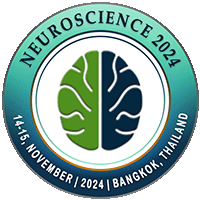
Marine Delsaute
Louvain-la-Neuve, UCLouvain, BelgiumTitle : Functional consequences of homozygous p.Gln121X mutation in human peroxiredoxin-5 gene
Abstract
Peroxiredoxins (PRDXs) are thiol-dependent peroxidases that are major antioxidant enzymes and redox modulators of cell signaling in mammalian cells. Peroxiredoxin-5 (PRDX5) is the only atypical 2-Cys PRDX in mammals. PRDX5
exhibits a wide subcellular localization and high expression levels in neuronal and glial cells in the central nervous system. Recently, a homozygous nonsense mutation (p.Gln121X) in PRDX5 gene has been identified in two young sisters suffering from severe motor and mental retardation, cerebral atrophy and epilepsy, suggesting an important role of PRDX5 in human central nervous system. To examine the putative functional consequences of PRDX5 p.Gln121X mutation, fibroblasts from both patients carrying the homozygous mutation were cultured in vitro. Western blotting analyses of PRDX5 protein showed that the full-length or the truncated protein are not expressed in these cells. RT-qPCR analyses of PRDX5 mRNA revealed that PRDX5 p.Gln121X transcripts are degraded. RT-qPCR analyses also showed that transcripts are degraded by nonsense-mediated mRNA decay (NMD) as revealed by NMD inhibition using NMDI-14 and G418. Moreover, our results suggest also that if a truncated protein can be expressed in other cell types, this protein is degraded by the proteasome as shown with the use of MG132 proteasome inhibitor. Altogether, our results suggest that homozygous p.Gln121X mutation in human PRDX5 gene triggers nonsense-mediated mRNA decay or proteasome-dependent degradation of the truncated PRDX5 protein.
Biography
Marine Delsaute has obtained a degree in
Veterinary sciences in 2016 in ULiège (Belgium)
and a degree in Management in 2018 in Solvay
Brussels School (Belgium). She then begin a PhD
in UCLouvain (Belgium) in the Louvain Institute
of Biomolecular Science and Technology. She is
also a teaching assistant in the field of Veterinary
anatomy.

